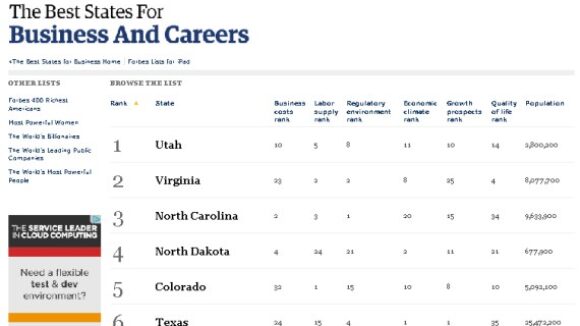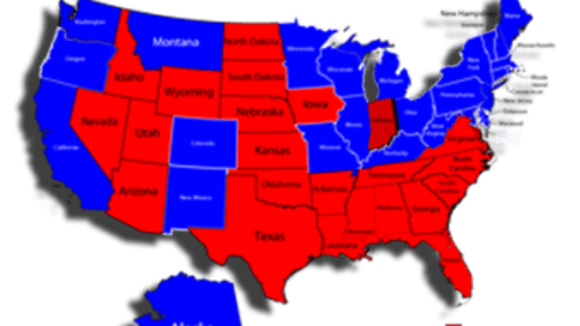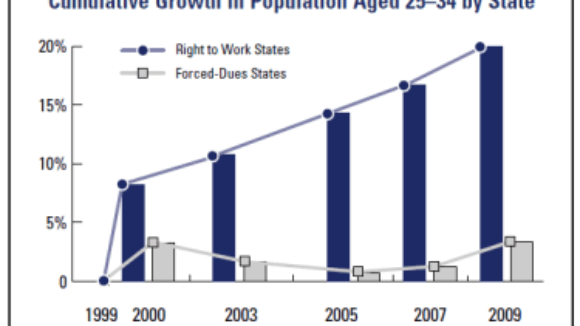Indiana ranked 49th in growth prospects by Forbes
When Forbes studied The Best States for Business and Careers, Indiana ranked 34th. Indiana ranked 49th in economic growth prospects. A Right To Law Act would change its 49th ranking. The…

When Forbes studied The Best States for Business and Careers, Indiana ranked 34th. Indiana ranked 49th in economic growth prospects. A Right To Law Act would change its 49th ranking. The…

The state legislature in North Carolina passed a resolution imploring the Democratic National Committee to respect the state’s Right to Work law: N.C. lawmakers are poised to approve a nonbinding resolution to ask the convention to change its rules and “respect…

Local business was promised a boost to the economy if the Democratic National Convention (DNC) came to Charlotte, North Carolina. But they were never told they would be discriminated against if they were not unionized.

Like their neighbors to the South, North Carolina is a Right to Work state but you wouldn’t know it by talking with their liberal governor Bev Purdue. She refuses to answer questions about the NLRB’s assault on Right…

Enacting a Right to Work law in Kentucky would be a boon for jobs and economic prosperity -- but don't just take our word for it. The Bowling Green Daily News agrees: Gov. Steve Beshear and the Democrat-controlled House are beholden to labor unions in this state and for that reason, year after year we continue to lose companies and jobs to other Southern states because Kentucky is not a right-to-work state. Right-to-work laws protect workers’ freedoms by not forcing them to pay dues to a union upon becoming employed or throughout employment. Nearly any citizen in a right-to-work state is protected by a state’s right-to-work law. Labor unions make up less than 9 percent of Kentucky’s workforce, so it would make sense that Beshear and the House would have more concern for the majority of the workforce. Sadly, they don’t. They need the unions, who contribute millions of dollars every election year through political action committees or other ways to encourage the governor and those in the House to follow part of their agenda, which is not allowing Kentucky to become a right-to-work state. Kentucky is the only Southern state not to have a right-to-work law. For that reason, many companies don’t even consider our state when choosing plant locations. Business 101 would tell you that this is simply bad business. The governor and House are hindering our state because they ignore reality. Shame on them. It reflects poor leadership and it holds our state back when competing for jobs that could be coming to Kentucky. Simpson County Judge-Executive Jim Henderson is a strong supporter of the right-to-work concept. Henderson said on a number of occasions during the process of trying to get a company to come to Franklin, it was eliminated because of not being a right-to-work state. He said it was communicated through correspondence and other means of communication that not having a right-to-work law is why companies aren’t coming to his city.One only has to look at companies such as Nissan North America. The company admitted that one reason it decided to move its headquarters from California to Tennessee and not Kentucky was because of the lower business costs. Interestingly enough, the average Kentuckian has to work 13 months to make what an average Tennessean can in one year.
At least 12 trade unions will boycott the Democratic National Convention in part because of its location -- Charlotte, North Carolina. Apparently, North Carolina and 21 other states are on a union blacklist because they are Right to Work states. The states are far from union-free, its just workers can't be forced to pay to a union boss. But in addition to locating in North Carolina, union bosses have "broad frustration" with President Obama and the Democrats in Congress. Obama and the Democrats have given big labor everything they could but, of course, that is not enough. The Charlotte Observer has the story: CHARLOTTE, N.C. — Casting North Carolina as an anti-union bastion with “regressive policies aimed at diluting the power of workers,” more than a dozen trade unions affiliated with the national AFL-CIO have told the Democratic National Committee that they will sit out the 2012 convention in Charlotte, N.C. Coming on the heels of some liberals’ complaints that President Barack Obama is giving in to Republicans, the unions’ decision is another sign that key Democratic allies are unhappy with Obama and other party leaders as they gear up for a difficult election season. It’s also a signal that anything relating to Charlotte — from its besieged hometown bank to its lack of unionized hotels — will face scrutiny as the city eases into the national spotlight. Labor unions have long played an integral role in Democratic conventions. And some big ones, including the National Education Association and the Service Employees International Union, still plan to be active participants when the Democrats come to Charlotte in 2012. Local and state labor leaders also are still on board. The N.C. AFL-CIO helped lobby for Charlotte to be the convention site. On Friday, a leader of the Raleigh-based labor group called the national unions’ decision understandable, but “shortsighted.”

The National Review's Andrew Stiles looks at the battle between the NLRB and elected officials and most interestingly points out that Democrats, elected from Right to Work states, have for the most part, refused to stand for the interests of their constituents. -- A group of GOP senators drafted legislation not only to head off the NLRB’s pending action against Boeing but also to prevent any similar attempts against other companies in the future. But the bill quickly stalled when it became clear that not one of the eleven Senate Democrats representing right-to-work states was willing to stand up to the White House and Big Labor by signing on as cosponsors. Not even Sens. Ben Nelson (D., Neb.) and Bill Nelson (D., Fla.), two moderates from right-to-work states facing tough reelection battles next year, would stick up for their states. -- Meanwhile, of the 22 governors in right-to-work states, only two are Democrats. One of them, Mike Beebe of Arkansas, has expressed concern that the NLRB ruling could be “detrimental” to his state’s economic-development efforts.

Indiana has already blown its chance to move to the top five next year, but New Hampshire, Missouri, and Maine still have the opportunity to turn their migration around. For the seventh year in…

Matt Mayer of the Buckeye Institute debunks the long-term economic growth without Right To Work freedom is sustainable. Mayer uses a Columbus Dispatch reporter Joe Hatlett column that featured Former Michigan Gov. Jennifer Granholm to expose the fact that corporate welfare and reduced regulations ignore the “proverbial elephant in the room weighing down” compulsory union states like Indiana, Ohio, Illinois,, and Michigan. From Matt Mayer’s post: “With Michigan bleeding jobs and tax revenues, Granholm said she followed the corporate playbook in her attempt to close a huge state budget deficit and make Michigan more competitive. ‘In listening to the business community, I cut takes [sic] 99 times, and I ended shrinking government more than any state in the nation. In my two terms, I cut more by far than any state in the nation. And yet, we still have the highest unemployment rate. There was no correlation.’ Granholm conceded that streamlining business regulations and lowering taxes — Kasich’s economic recovery mantra — are helpful, but they aren’t a panacea…[l]abor costs, help with start-up costs and proximity to markets are other factors.” Hallett and Governor Granholm fail to mention why streamlining regulations and lowering taxes aren’t helping the northern states (located within 50 percent of the U.S. population and with low start-up costs) compete against the southern and western states. Instead, Hallett ignores the obvious answer and pleads for an end to corporate pork (with which we enthusiastically agree). The reason Michigan and Ohio can’t compete is that the southern and western states already have fewer regulations and lower taxes, so “catching up” with those states still leaves the proverbial elephant in the room weighing down the northern states. Plus, those states are also pushing for lower taxes and fewer regulations, so the northern states are perpetually behind them. The elephant, which Governor Granholm does hint at, is labor costs, or, more specifically, unionized labor costs (see: General Motors and the United Auto Workers). As I noted in Six Principles for Fixing Ohio, “Of course, tax and regulatory burdens also impact a state’s economy. Although many of the forced unionization states have heavy tax burdens and many of the worker freedom states have light tax burdens, some heavily taxed worker freedom states (Idaho, Nevada, and Utah) had the strongest sustained job growth from 1990 to today. Similarly, a few moderately taxed forced unionization states still had weak job growth (Indiana, Illinois, and Missouri). The combination of both a heavy tax burden and forced unionization is deadly when it comes to job growth, as 11 of the 15 worst performing states are ranked in the top 20 for high tax burdens.” If Ohio and the other states from Missouri to Maine want to truly compete with Texas, Georgia, and South Carolina, then those states need to enact laws that protect the rights of workers not to join a labor union to get a job.